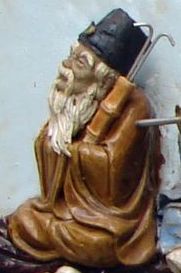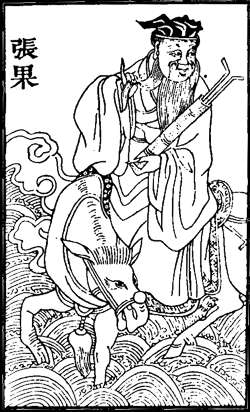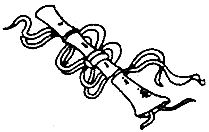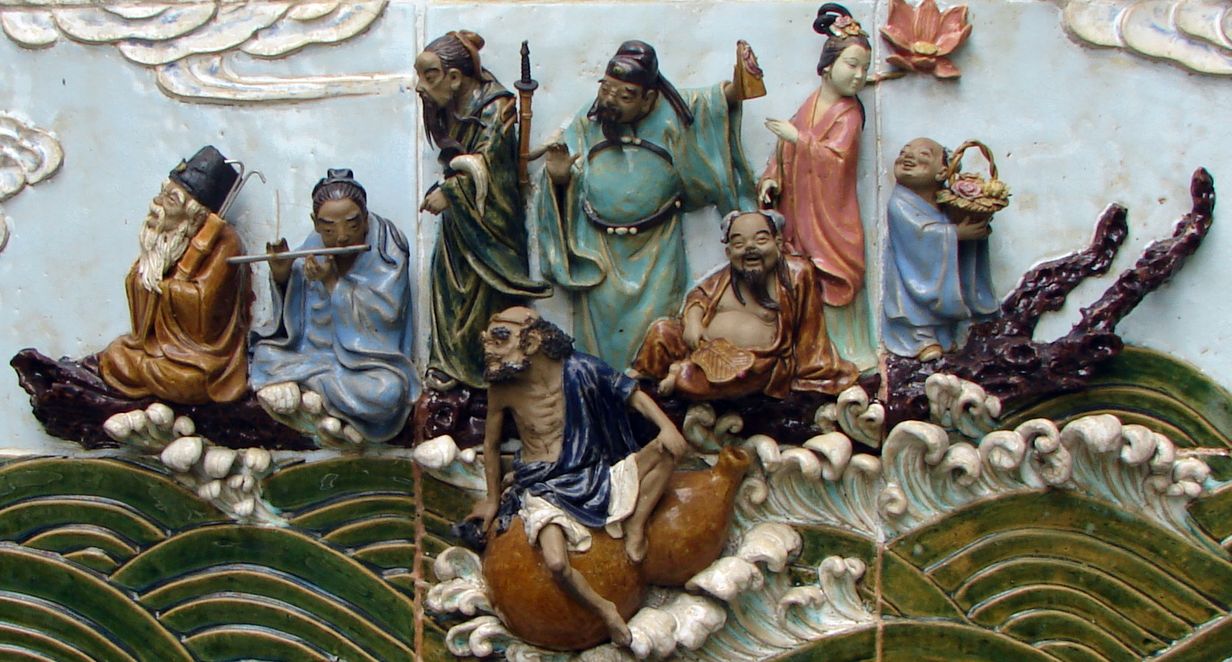
Content created: 2010-12-30
File last modified:
Go to next story.

ZHĀNG Guǒ Lǎo 张果老 = a venerable Daoist
Empress WǓ Zétiān 武则天 = an empress
Emperor Xuánzōng 玄宗 = her descendent, an emperor fond of renaming himself in hopes of giving his reign a fresh start
Emperor Mínghuáng 明皇 = Emperor Xuánzōng by another name
Emperor Tiānbǎo 天宝 = Emperor Xuánzōng by another name
PEÍ Wù 裴晤 = an imperial envoy
XÍNG Hépú 邢和璞 = an elderly courtier, obsessed with age
YÈ Fǎshàn 叶法善 = a court magician
A donkey = a patient animal clever enough to find its own way

When the world came into existence, and the heavens and the earth were just being formed, a white rat emerged from the chaos, which became a bat, and the bat became a spirit (jīng 精), and the spirit became a person. His name was ZHĀNG Guǒ 张果, although, in view of his great age, more often people like to add the title lǎo 老, which means “old and venerable,” so he is usually called Zhāng Guǒ lǎo 张果老.
Obviously he was not always old. For that matter, he was not always named Zhāng. That is merely where this story begins. If you want to know what he was like before he became Zhāng Guǒ, the old and venerable, you will need to read the prequel to this story.
As an ancient sage, Zhāng Guǒ lǎo lived in the Zhōngtiáo 中条山 Mountains in the Héngzhōu 恒州府 district, near the modern city of Línfén 临汾 in Shānxī 山西 Province.
Despite his great age, some people living in this area still claim to see him from time to time. People say he rides a white donkey, which can cover many hundreds of miles in a single day. Sometimes he faces forward, but more often he faces backward, perhaps to keep the wind out of his face, perhaps because he suspects that whichever way he goes there will be problems. When he is not traveling, the donkey can be folded up like a piece of paper which he keeps in a little box and stashes in a pocket or bag. When he needs the donkey again, he only has to spit a little water on the tiny packet, and it unfolds into a donkey once again.
In the Táng 唐 dynasty (period 12), both emperor Tàizōng 太宗 (reign 12a-2) and emperor Gāozōng 高宗 (reign 12a-3), having heard of this remarkable man, sought to have him come to court, but he always evaded their invitations. The Empress Wǔ Zétiān 武则天 (reign 12a-6) was almost successful, for he agreed to come and meet her, but as he travelled with her envoy past the famous Temple of the Jealous Woman (Dùnǚ Miào 妒女庙) he suddenly dropped dead.
The envoys tried everything they could think of to revive him, but dead was dead. Worse yet, the weather was quite hot, and the body immediately began to stink. So there was nothing left for them to do but return to the empress and report what had happened, and she had to live without meeting him. Not long afterward, however, travelers in the mountains spotted him, returned from the dead and living happily as before.
Some years later, Emperor Xuánzōng 玄宗 (reign 12a-9) of the Táng dynasty tried to persuade Zhāng Guǒ to go to his capital in the beautiful city of Luòyáng 洛阳, in Hénán 河南, and even had him elected Chief of the Imperial Academy, with the grandiose title of Very Perspicacious Teacher. But Zhāng Guǒ was not very interested in titles.
In the second part of his reign, Emperor Xuánzōng called himself Emperor Mínghuáng 明皇 (reign 12a-9), and having changed the name of his reign, he sent an envoy named PEÍ Wù 裴晤 to the mountains to invite Zhāng Guǒ to the court once again. But once again Zhāng Guǒ immediately died. Peí Wù had heard about how Zhāng Guǒ died when things got inconvenient, and so he knew that he had not really died, even if he began to rot. Peí Wù burned incense before the body and spoke, telling him that the emperor very, very, very sincerely and wholeheartedly wanted to meet him. Eventually Zhāng Guǒ opened his eyes. Peí did not dare force him to go, so he returned and reported what had happened to Emperor Mínghuáng, who sent more people with a letter of invitation so polite and so self-effacing that Zhāng Guǒ could not refuse without great embarrassment.
And so it happened that he travelled to the capital and became a guest at the great imperial library, called the Court of the Virtuous (Jíxián Yuàn 集贤院), where the emperor and all the officials went to pay homage to him, and the emperor asked him about the world of gods and immortals, but he did not reveal very much.

One day the emperor thought to ply him with wine, but Zhāng Guǒ replied: “My capacity for drinking is very limited. However, I have a disciple who is much better at it. I’ll invite him to come and drink.”
Soon a handsome young Daoist priest appeared, some fifteen or sixteen years old. The emperor found him enormously appealing, and was delighted to have him sit and drink with them, hoping that perhaps the naïve disciple might reveal more than the master. Zhāng Guǒ cautioned that the young man could become raucous if he consumed more than one dǒu 斗 of wine. Young men tend toward that, he explained.
However the emperor paid no attention, and gave the boy more and more until he was quite drunk. In his drunkenness, the lad swayed from side to side until at length his hat fell off, and suddenly he was transformed into a jug of wine, which is one of those things that tradition warns us can happen to people who become very drunk. The emperor was startled, but Zhāng Guǒ laughingly assured him that the jug was not in fact a disciple, and never had been, but was simply a vessel lent him by the imperial library to amuse the emperor.
As we can see, Zhāng Guǒ’s magical abilities were quite good. He could become visible or invisible at will. He could point at a bird in flight, and it would fall down onto the table where he sat. He could point at a flower bud and it would open into a full flower. He could point at a lock and it would open or close as he wished. He could make the whole palace move to a different location and then return. He could walk on water, and he could make flowers bloom in the midst of fire. But, although he enjoyed the emperor's hospitality at court for nearly twenty years, what he would not do was to teach him about Daoism.
He told people he had been born in the time of the legendary Emperor Yáo 尧 (reign 01a-8), nearly three thousand years earlier, although he looked to be but sixty or seventy years old. There was in the court a man named Xíng Hépú 邢和璞 who could guess people’s ages, and he doubted that Zhāng Guǒ could have been born in the reign of Yáo, but he was unable to make any sense of Zhāng’s age.
Also at court there was a Daoist named Yè Fǎshàn 叶法善, who was quite good at magic and at exorcisms. So Emperor Mínghuáng summoned him and asked who this Zhāng person really was. Daoist Yè dared not say, for if he did so, he said, he would surely be struck dead. The emperor begged and begged, even though begging was not very good form for an emperor. At length, Daoist Yè conceded that he would be willing to reveal Zhāng Guǒ’s identity and to be struck dead so long as the emperor would promise that as soon as he was struck dead, his highness would go to Zhāng Guǒ and humbly ask his forgiveness. Emperor Mínghuáng happily agreed.
“Zhāng Guǒ is a primordial white bat spirit (bái biānfú jīng 白蝙蝠精),” said the Daoist, and he collapsed dead upon the floor.
And so Emperor Mínghuáng went to see Zhāng Guǒ. He took off his shoes and his crown and knelt on the floor and asked the old man’s forgiveness for Daoist Yè. Zhāng Guǒ was not pleased at all that Daoist Yè had shown a willingness to reveal heavenly secrets, but looking down at the emperor pounding his head on the floor he relented and threw a pan of water over Daoist Yè, who was instantly brought back to life, just as he had predicted he would be.
Knowing what he now knew, the emperor became even more deferential. He had a portrait made of Zhāng Guǒ to be hung in the Jíxián Yuàn Monastery with the title the “Elder of Universal Mysteries” (Tōngxuán Xiānshēng 通玄先生).
When the time came for Zhāng Guǒ to return to his mountains, the emperor sent him off in great style, in a sedan chair and with horses bearing gifts. Later, in the Tiānbǎo 天宝 part of his reign (AD 742-755), Emperor Mínghuáng sent again to invite him to visit. Again, he immediately died, and his disciples even buried him. Later, when they opened his coffin to check on the condition of his body, the box was quite empty. Being an immortal, he had no need of a coffin, and had gone on his way.

Hoping to draw him back, the emperor commissioned a small hermitage to be built in his honor, called the Hermitage of the Purple Cloud Roost (Qīxía Guàn 栖霞观), which sounded very Daoist. But Zhāng Guǒ never returned. Unless, of course, the people are right who say they have glimpsed him recently.
In art Zhāng Guǒ lǎo is usually shown astride his donkey, and is nearly always shown as an old man carrying a bamboo tube (called a "fish drum" or yúgǔ 鱼鼓) with two hooked rods sticking out, which he apparently could use as drumsticks. He appears in several popular proverbs or expressions. (Link)

Return to top
Go to
next story